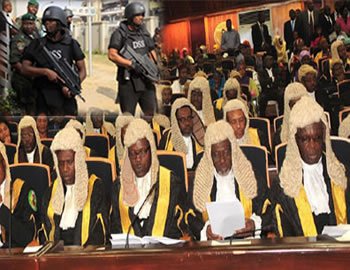
Apall of darkness fell upon the third arm of government recently when the Department of State Service (DSS) in a Gestapo-like fashion, invaded the homes of some senior judicial officers and arrested them. This unprecedented action by an agency in the executive branch of government was carried out in the wee hours of October 8, 2016, a Saturday. In two or three instances, doors were broken and door frames uprooted in order for the DSS to gain entry. The mission of the DSS was to get the judicial officers to respond to the allegations of bribery and corruption levelled against them.
The cloud has yet to recede as the controversy around the desecration of the judiciary rages on. Although opinions on the propriety or otherwise of the conduct of the DSS are divergent, the preponderance of condemnation of the DSS’ action by many well informed Nigerians and the critical stakeholders in the legal profession offers a glimmer of hope that all sense of decorum and decency may not have been lost in the course of the nation’s relentless war against corruption. To be sure, corruption exists in the judiciary just like in many other institutions in the country and there is no doubt about a national consensus on anti-corruption. But the arrest of the judges by the DSS is rather unique.
The statutory agencies ordinarily charged with the responsibility of fighting corruption in the land are the Economic and Financial Crime Commission (EFCC), the Independent Corrupt Practices Commission (ICPC) and the Police. The mandate of the State Security Service (SSS) also known as DSS is lucid and unambiguous; it is within the precinct of internal security and of course includes investigation of financial crimes that threaten internal security. However, whether the alleged taking of bribes by the judges can be said to threaten the internal security of Nigeria is a question for the courts to decide. Even then, the executive branch would not have been in order if it had allowed the Police, EFCC or ICPC to handle the investigation of the judicial officers.
The issue is a constitutional one which is already settled. The constitution, which takes precedence over any other statutes in the land, is very clear about the role of the National Judicial Council (NJC) in the appointment, promotion and discipline of aberrant judges. In other words, the NJC should have been allowed to investigate and mete out administrative sanctions to those who are found guilty while the Police, EFCC or ICPC can subsequently proceed with the prosecution of the criminal aspects of the alleged infractions.
For criminal matters such as bribery and corruption, the NJC is by no means the terminus for the aggrieved party, state or individual to seek redress. Thus, the idea of the NJC treating the judges with kid gloves should not arise. The import of strict adherence to procedure should be understood against the backdrop that it is much easier to arrest, detain and charge a retired or dismissed judge to court than to do same to a serving one without creating a dilemma.
For instance, all the judges indicted by the DSS are still eligible to sit in their courts to dispense justice because they are yet to be dismissed or retired by the NJC. But who would have confidence in judges that are being treated like common criminals? Assuming but not conceding that the NJC has not acquitted itself creditably, this cannot justify the DSS’s move. The NJC is a creation of the constitution: if it is not living up to its billing, it should be called to order or the constitution could be amended to strip it of its mandate. And until that is done, any measure taken by the state to obviate the NJC’s seeming tardiness in disciplining corrupt judges is tantamount to self-help.
The real issue is not whether a security agent or persons effecting arrest can force, if the need arises, to arrest a suspect. The Administration of Criminal Justice Act (ACJA S.12 (2)) permits it. Similarly S.148 of the same ACJA provides that a search warrant may be issued and executed at any time or any day including
a Sunday and holiday but the 1999 Constitution of Nigeria (as amended) which is superior to ACJA unequivocally provides for the respect for the dignity of human person which is clearly at variance public with the raid of the homes of the judges in the wee hours and their inadvertent subjection to public odium by the DSS.
The drafters of the ACJA envisage that implementers would fully comprehend the spirit of the Act and not just the letter. For instance, in this era of pervasive insecurity occasioned by the activities of armed robbers and kidnappers among others, what the crude use of force by the DSS did to the emotion and psyche of the judges and in particular members of their family could only be imagined. Perhaps it should be reiterated that if the rule of law is abbreviated in the course of correcting an infraction, that action in itself is worse than the infraction being corrected because of its far reaching implications. The arrest of the judges in ungodly hours and the dramatization of the arrest and the alleged cash recovered from their homes in the media by the DSS before their side of the story could be heard cannot be justified .
We urge the executive branch of government to discretely prosecute the war against corruption within the ambit of the law and devoid of political undertones. In the same vein, the judiciary owes the nation a bounden duty to purge itself of elements that dent its image through acts of corruption.
END

Be the first to comment